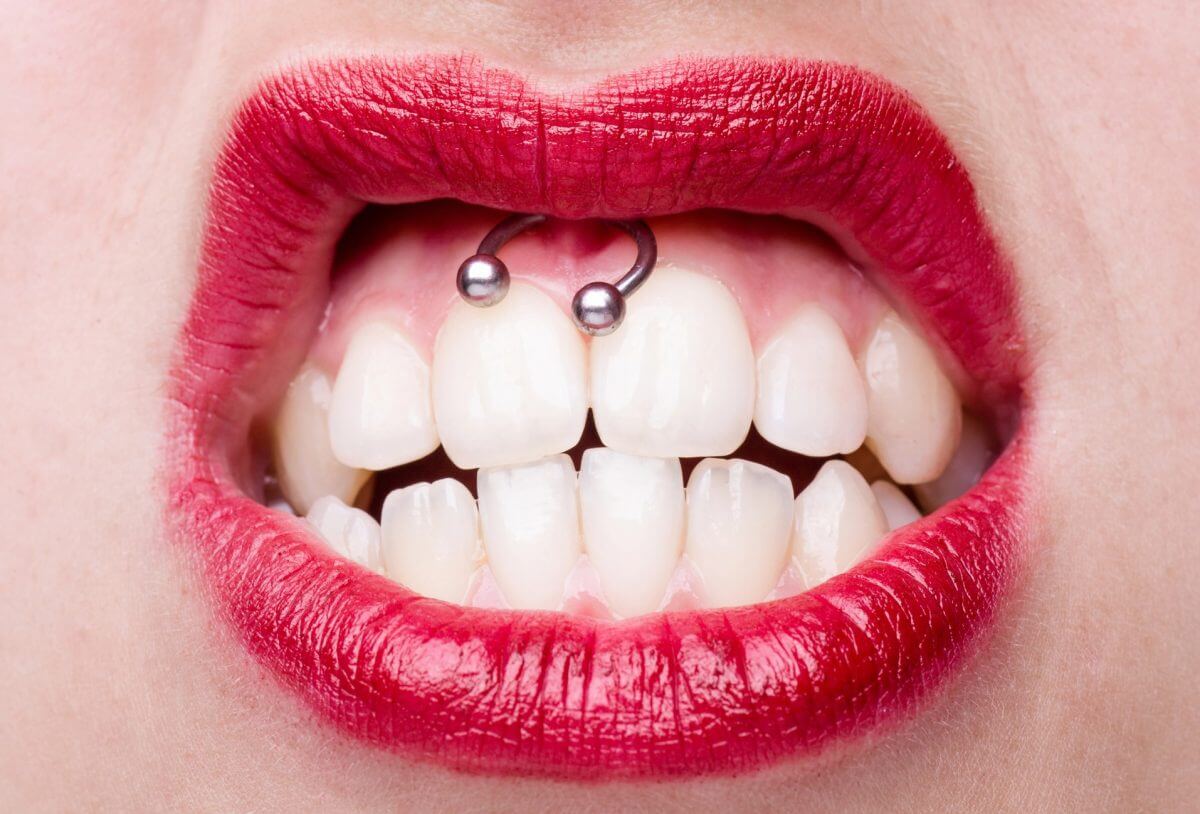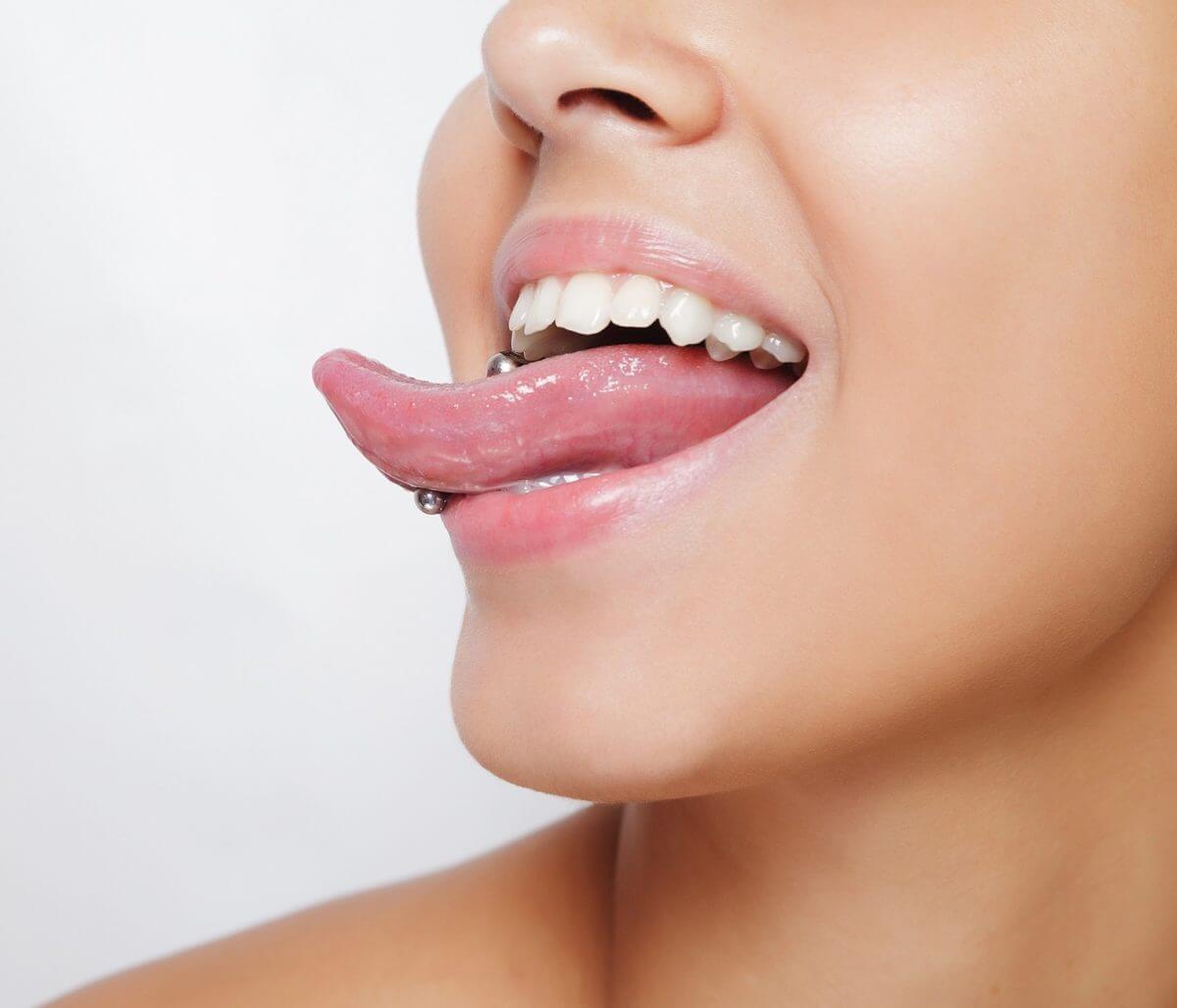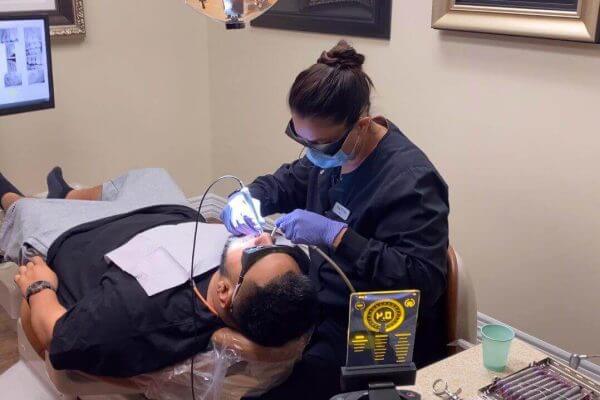The Impact of Lip and Tongue Piercings on Oral Health
Navigating the Risks of Piercings
In recent years, lip and tongue piercings have surged in popularity among various age groups, offering a way for individuals to express their personal style and identity.
Despite their aesthetic appeal, these modifications come with potential risks, particularly to oral health. At Lakefront Family Dentistry, Dr. Derek Hauser and Dr. Mark Phillipe are committed to educating our patients on how these choices can impact their dental well-being and overall health.

Understanding Oral Piercings
Oral piercings, which typically involve the tongue, lips, cheeks, or combinations thereof, are not just fashion statements—they are medical procedures that penetrate soft tissues in the mouth. While some seek these piercings for cultural or personal reasons, every person should consider the possible health implications.
Potential Risks Associated with Oral Piercings
Infection from Oral Piercings
Infections are common risks associated with oral piercings due to the abundance of bacteria in the mouth. Inadequate care of the piercing site can lead to bacteria entering the piercing wound, which can cause an infection.
Symptoms of an Infection from Oral Piercings May Include:
- Pain: Continuous or increasing pain at the piercing site, which may not subside over time.
- Swelling: Persistent or worsening swelling beyond the initial few days after piercing.
- Redness: Intensified redness around the site that may spread as the infection worsens.
- Heat: The area around the piercing may feel unusually warm to the touch.
- Discharge: Presence of pus, which can be white, yellow, or green in color, indicating a bacterial infection.
- Foul Odor: An unpleasant smell emanating from the piercing site.
- Fever: In more severe cases, the infection can lead to fever or chills, indicating that the infection might be spreading.
Treatment for Infection:
Immediate treatment involves proper cleaning of the area with saline solutions and possibly antibiotics prescribed by a healthcare professional. It is crucial to keep the area clean and dry, and in some cases, removing the jewelry temporarily or permanently may be necessary to allow the infection to heal.

Damage to Teeth and Gums from Oral Piercings
Oral piercings, especially those on the tongue and lips, can pose significant risks to dental health, including damage to teeth and gums.
Types of Damage Include:
- Chipped or Cracked Teeth: Hard metal jewelry can easily chipped teeth or cracked teeth, especially when it comes into contact with them during eating, talking, or sleeping. This is more common with tongue piercings.
- Receding Gums: Jewelry, particularly from lip piercings, can rub against the gums continuously, leading to gum recession. This can expose the roots of teeth, increasing the risk of decay and sensitivity.
- Enamel Wear: Constant contact with metal can wear down the protective enamel on the teeth, leading to increased tooth sensitivity and susceptibility to cavities.
- Tooth Mobility: In severe cases of gum damage, teeth may become loose, which is a condition that can lead to tooth loss if untreated.
Treatment and Prevention:
- Regular Dental Check-ups: Frequent visits to the dentist can help catch and address any dental issues early before they develop into more severe problems.
- Switching Jewelry: Replacing metal jewelry with plastic or other softer materials can reduce the risk of damage.
- Good Oral Hygiene Practices: Maintaining excellent oral hygiene by brushing and flossing regularly can help protect the teeth and gums from the effects of piercings.
- Removal of Piercings: In cases where damage is recurrent or severe, the removal of the piercing may be the best course of action to prevent further damage.
Understanding these risks and symptoms is crucial for anyone with or considering oral piercings. Regular consultations with Dr. Phillipe and Dr. Hauser at Lakefront Family Dentistry can help manage these risks effectively and maintain oral health.
Allergic Reactions to Oral Piercings
Allergic reactions from oral piercings usually occur when the body reacts negatively to the material used in the piercing jewelry, commonly nickel but sometimes other metals like chromium and cobalt.
Symptoms of an allergic reaction can vary depending on the severity but typically include:
- Localized Swelling: The area around the piercing may become swollen and tender to the touch.
- Redness and Rash: Redness around the site of the piercing is common, and a rash may develop in more severe cases.
- Itching: The area around the piercing may feel itchy, which can be particularly uncomfortable inside the mouth.
- Discharge: In some cases, a clear or slightly colored discharge, not to be confused with pus, which indicates infection, may be present.
- Pain: Persistent pain around the piercing site that doesn’t seem to improve with time.
Choosing high-quality, hypoallergenic materials such as surgical steel, titanium, or biocompatible plastics can help minimize these risks. If symptoms of an allergic reaction occur, it is essential to seek immediate advice from the top dentists at Lakefront Family Dentistry in Lake Elsinore, California. Switching the jewelry to a hypoallergenic material typically resolves the symptoms.

Nerve Damage from Oral Piercings
Nerve damage resulting from tongue piercings can vary in severity from mild to severe and may be temporary or permanent. This type of injury occurs when the needle used to create the piercing punctures or compresses nerve pathways in the tongue.
Symptoms of nerve damage may include:
- Numbness or Loss of Sensation: The most common symptom, where the individual may not feel touch or temperature changes on or around the area of the piercing.
- Tingling Sensations: A feeling of “pins and needles,” akin to the limb ‘falling asleep’ but localized around the area of the piercing.
- Impaired Taste: Damage to the nerve can affect the tongue’s ability to taste, which may be partial or total and temporary or permanent.
- Difficulty Moving the Tongue: In severe cases, if the damage impacts the motor function of the tongue, there may be difficulty with movement, affecting speech and the ability to eat.
Treatment for nerve damage depends on the severity. Mild cases often resolve on their own as the nerve repairs itself, which can take weeks to months.
More severe cases might require medical interventions such as medications to manage symptoms or, in rare cases, surgical repair.
Consulting with a healthcare provider is crucial for a proper diagnosis and treatment plan. Immediate removal of the piercing and medical consultation is advised if nerve damage is suspected.
Oral Function Interference from Oral Piercings
Oral piercings, particularly those located on the tongue and lips, can significantly affect the basic functions of the mouth. These disruptions can impact speech, eating, and even the salivary flow, leading to discomfort and other oral health issues.
Common Oral Function Interferences Include:
- Speech Impediments: Tongue piercings can hinder speech clarity. The jewelry can interfere with the movement of the tongue, which is crucial for articulating certain sounds and words. Individuals with new piercings may notice a temporary lisp or difficulty pronouncing certain consonants, particularly ‘s’, ‘d’, ‘t’, and ‘z’ sounds.
- Chewing and Swallowing Difficulties: Both tongue and lip piercings can complicate the chewing process. The presence of jewelry can feel awkward, causing individuals to chew slowly or change their biting patterns to avoid biting down on the metal. This unnatural adaptation can lead to inefficient chewing of food, which impacts digestion. Additionally, tongue piercings can sometimes cause a gag reflex or discomfort during swallowing.
- Increased Saliva Production: Oral piercings, especially tongue piercings, can stimulate excessive saliva production. The body might react to the foreign object as it would to food, hence increasing saliva as a part of the digestive process. Excessive saliva production can be uncomfortable and may lead to frequent swallowing and speech difficulties.
- Altered Taste Sensation: In some cases, metal piercings can leave a metallic taste in the mouth or even alter the taste sensations due to interactions with the taste buds. This alteration can detract from the enjoyment of food and affect appetite.
Management and Adaptation Strategies:
- Adjusting Jewelry Size and Material: Using smaller or shorter jewelry made from materials that minimize irritation can help reduce interference with oral functions. Biocompatible materials such as surgical-grade plastics may be less obstructive and more comfortable than metal.
- Speech Therapy: If speech impairment persists, consulting with a speech therapist can be beneficial. Speech therapists can provide exercises and strategies to improve articulation and overcome speech difficulties caused by piercings.
- Gradual Adaptation: Over time, individuals with new piercings can adapt to the presence of the jewelry. However, this adaptation varies from person to person. Mindful eating and speaking practices can help mitigate discomfort during this adjustment period.
- Regular Dental and Medical Check-ups: Ongoing consultations with healthcare providers are crucial. They can monitor the piercing’s impact on oral functions and overall oral health, providing advice or interventions when necessary.
Understanding and addressing these potential interferences can help individuals with oral piercings maintain better oral function and comfort. If the interference becomes too disruptive or persistent, it may be advisable to consider the removal of the piercing to restore normal oral function.
CEREC Veneers and Crowns
For patients experiencing dental issues such as chipped or damaged teeth due to piercings, Lakefront Family Dentistry offers state-of-the-art CEREC veneers and crowns. Our in-house dental lab utilizes CEREC technology to create custom veneers and crowns that perfectly match the color and contour of your natural teeth, enhancing both aesthetics and function.
- Veneers: If a chipped tooth needs aesthetic correction, CEREC veneers can be an excellent option. Typically completed in 2-3 visits, these veneers are custom-made to cover the front surface of your teeth, providing a new facade that is indistinguishable from your natural teeth.
- Crowns: For more significant damage that requires full coverage, we offer CEREC crowns that can be designed and placed within a single visit. This same-day service is not only convenient but also ensures that your smile is restored without multiple lengthy appointments.

Preventative Care and Maintenance
Proper care and maintenance are vital to minimize the risks associated with oral piercings. Routine cleaning of the piercing site, ideally with saline solutions, is crucial to prevent infection. Additionally, regular check-ups at Lakefront Family Dentistry located in Lake Elsinore, California, can help ensure that any complications are caught and addressed early.
Role of Dental Professionals in Managing Risks
The best dentists in the Inland Empire, Dr. Derek Hauser, DDS, and Dr. Mark Phillipe, DDS, play a critical role in managing the risks associated with oral piercings. At Lakefront Family Dentistry, our dentists educate patients on proper oral hygiene practices and regularly inspect the health of tissues affected by piercings.
For individuals with oral piercings, we recommend more frequent dental check-ups to monitor for damage and ensure that any developing issues are addressed promptly.
Alternatives to Metal-Based Piercings
For those concerned about the risks but still interested in oral piercings, there are safer alternatives to metal-based jewelry. Plastic-based or other biocompatible materials can significantly reduce the risk of allergic reactions and damage to oral structures. These materials are less likely to harbor bacteria and are softer on the teeth and gums.
While lip and tongue piercings can be attractive and meaningful for many, they come with a set of risks that should not be overlooked.
Lakefront Family Dentistry provides our patients with all the information they need to make informed decisions about oral piercings. We encourage anyone considering an oral piercing to consult with us first. This way, our dentists can discuss how to minimize risks and maintain optimal oral health.
Request a Dental Appointment with Dr. Derek Hauser or Dr. Mark Phillipe
Are you considering an oral piercing, or do you already have one? Schedule a consultation with Dr. Phillipe or Dr. Hauser at Lakefront Family Dentistry today. Our dental team is also here to help you understand the risks and manage your oral health effectively. Call us on (951) 244-9495 to ensure that your style choices align with your health priorities.





